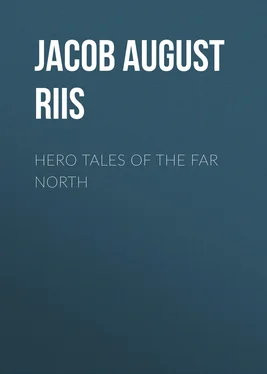Jacob August Riis - Hero Tales of the Far North
Здесь есть возможность читать онлайн «Jacob August Riis - Hero Tales of the Far North» — ознакомительный отрывок электронной книги совершенно бесплатно, а после прочтения отрывка купить полную версию. В некоторых случаях можно слушать аудио, скачать через торрент в формате fb2 и присутствует краткое содержание. Жанр: foreign_prose, История, foreign_edu, foreign_antique, на английском языке. Описание произведения, (предисловие) а так же отзывы посетителей доступны на портале библиотеки ЛибКат.
- Название:Hero Tales of the Far North
- Автор:
- Жанр:
- Год:неизвестен
- ISBN:нет данных
- Рейтинг книги:4 / 5. Голосов: 1
-
Избранное:Добавить в избранное
- Отзывы:
-
Ваша оценка:
- 80
- 1
- 2
- 3
- 4
- 5
Hero Tales of the Far North: краткое содержание, описание и аннотация
Предлагаем к чтению аннотацию, описание, краткое содержание или предисловие (зависит от того, что написал сам автор книги «Hero Tales of the Far North»). Если вы не нашли необходимую информацию о книге — напишите в комментариях, мы постараемся отыскать её.
Hero Tales of the Far North — читать онлайн ознакомительный отрывок
Ниже представлен текст книги, разбитый по страницам. Система сохранения места последней прочитанной страницы, позволяет с удобством читать онлайн бесплатно книгу «Hero Tales of the Far North», без необходимости каждый раз заново искать на чём Вы остановились. Поставьте закладку, и сможете в любой момент перейти на страницу, на которой закончили чтение.
Интервал:
Закладка:
However, the King was his friend. He made him a nobleman, and gave him the name Tordenskjold. It means "thunder shield."
"Then, by the powers," he swore when he was told, "I shall thunder in the ears of the Swedes so that the King shall hear of it!" And he kept his word.
Charles had determined to take Denmark with one fell blow. He had an army assembled in Skaane to cross the sound, which was frozen over solid. All was ready for the invasion in January 1716. The people throughout Sweden had assembled in the churches to pray for the success of the King's arms, and he was there himself to lead; but in the early morning hours a strong east wind broke up the ice, and the campaign ended before it was begun. Charles then turned on Norway, and laid siege to the city of Frederikshald, which, with its strong fort, Frederiksteen, was the key to that country. A Danish fleet lay in the Skagerak, blocking his way of reënforcements by sea. Tordenskjold, with his frigate, Hvide Örnen , and six smaller ships (the frigate Vindhunden of sixteen guns, and five vessels of light draught, two of which were heavily armed), was doing scouting duty for the Admiral when he learned that the entire Swedish fleet of forty-four ships that was intended to aid in the operations against Frederikshald lay in the harbor of Dynekilen waiting its chance to slip out. It was so well shielded there that its commander sent word to the King to rest easy; nothing could happen to him. He would join him presently.
Tordenskjold saw that if he could capture or destroy this fleet Norway was saved; the siege must perforce be abandoned. And Norway was his native land, which he loved with his whole fervid soul. But no time was to be lost. He could not go back to ask for permission, and one may shrewdly guess that he did not want to, for it would certainly have been refused. He heard that the Swedish officers, secure in their stronghold, were to attend a wedding on shore the next day. His instructions from the Admiralty were: in an emergency always to hold a council of war, and to abide by its decision. At daybreak he ran his ship alongside Vindhunden , her companion frigate, and called to the captain:
"The Swedish officers are bidden to a wedding, and they have forgotten us. What do you say—shall we go unasked?"
Captain Grip was game. "Good enough!" he shouted back. "The wind is fair, and we have all day. I am ready."
That was the council of war and its decision. Tordenskjold gave the signal to clear for action, and sailed in at the head of his handful of ships.
The inlet to the harbor of Dynekilen is narrow and crooked, winding between reefs and rocky steeps quite two miles, and only in spots more than four hundred feet wide. Halfway in was a strong battery. Tordenskjold's fleet was received with a tremendous fire from all the Swedish ships, from the battery, and from an army of four thousand soldiers lying along shore. The Danish ships made no reply. They sailed up grimly silent till they reached a place wide enough to let them wear round, broadside on. Then their guns spoke. Three hours the battle raged before the Swedish fire began to slacken. As soon as he noticed it, Tordenskjold slipped into the inner harbor under cover of the heavy pall of smoke, and before the Swedes suspected their presence they found his ships alongside. Broadside after broadside crashed into them, and in terror they fled, soldiers and sailors alike. While they ran Tordenskjold swooped down upon the half-way battery, seized it, and spiked its guns. The fight was won.
But the heaviest part was left—the towing out of the captured ships. All the afternoon Tordenskjold led the work in person, pulling on ropes, cheering on his men. The Swedes, returning gamely to the fight, showered them with bullets from shore. One of the abandoned vessels caught fire. Lieutenant Tönder, of Tordenskjold's staff, a veteran with a wooden leg, boarded it just as the quartermaster ran up yelling that the ship was full of powder and was going to blow up. He tried to jump overboard, but the lieutenant seized him by the collar and, stumping along, made him lead the way to the magazine. A fuse had been laid to an open keg of powder, and the fire was sputtering within an inch of it when Lieutenant Tönder plucked it out, smothered it between thumb and forefinger, and threw it through the nearest port-hole. There were two hundred barrels of powder in the ship.
Tordenskjold had kept his word to the King. Not as much as a yawl of the Dynekilen fleet was left to the enemy. He had sunk or burned thirteen and captured thirty-one ships with his seven, and all the piled-up munitions of war were in his hands. King Charles gave up the siege, marched his army out of Norway, and the country was saved. The victory cost Tordenskjold but nineteen killed and fifty-seven wounded. On his own ship six men were killed and twenty wounded.
Of infinite variety was this sea-fighter. After a victory like this, one hears of him in the next breath gratifying a passing whim of the King, who wanted to know what the Swedish people thought of their Government after Charles's long wars that are said to have cost their country a million men. Tordenskjold overheard it, had himself rowed across to Sweden, picked up there a wedding party, bridegroom, minister, guests, and all, including the captain of the shore watch who was among them, and returned in time for the palace dinner with his catch. King Frederik was entertaining Czar Peter the Great, who had been boasting of the unhesitating loyalty of his men which his Danish host could not match. He now had the tables turned upon him. It is recorded that the King sent the party back with royal gifts for the bride. One would be glad to add that Tordenskjold sent back, too, the silver pitcher and the parlor clock his men took on their visit. But he didn't. They were still in Copenhagen a hundred years later, and may be they are yet. It was not like his usual gallantry toward the fair sex. But perhaps he didn't know anything about it.
Then we find him, after an unsuccessful attack on Göteborg that cost many lives, sending in his adjutant to congratulate the Swedish commandant on their "gallant encounter" the day before, and exchanging presents with him in token of mutual regard. And before one can turn the page he is discovered swooping down upon Marstrand, taking town and fleet anchored there, and the castle itself with its whole garrison, all with two hundred men, swelled by stratagem into an army of thousands. We are told that an officer sent out from the castle to parley, issuing forth from a generous dinner, beheld the besieging army drawn up in street after street, always two hundred men around every corner, as he made his way through the town, piloted by Tordenskjold himself, who was careful to take him the longest way, while the men took the short cut to the next block. The man returned home with the message that the town was full of them and that resistance was useless. The ruse smacks of Peder Wessel's boyish fight with a much bigger fellow who had beaten him once by gripping his long hair, and so getting his head in chancery. But Peder had taken notice. Next time he came to the encounter with hair cut short and his whole head smeared with soft-soap, and that time he won.
The most extraordinary of all his adventures befell when, after the attack on Strömstad, he was hastening home to Copenhagen. Crossing the Kattegat in a little smack that carried but two three-pound guns, he was chased and overtaken by a Swedish frigate of sixteen guns and a crew of sixty men. Tordenskjold had but twenty-one, and eight of them were servants and non-combatants. They were dreadfully frightened, and tradition has it that one of them wept when he saw the Swede coming on. Her captain called upon him to surrender, but the answer was flung back:
Читать дальшеИнтервал:
Закладка:
Похожие книги на «Hero Tales of the Far North»
Представляем Вашему вниманию похожие книги на «Hero Tales of the Far North» списком для выбора. Мы отобрали схожую по названию и смыслу литературу в надежде предоставить читателям больше вариантов отыскать новые, интересные, ещё непрочитанные произведения.
Обсуждение, отзывы о книге «Hero Tales of the Far North» и просто собственные мнения читателей. Оставьте ваши комментарии, напишите, что Вы думаете о произведении, его смысле или главных героях. Укажите что конкретно понравилось, а что нет, и почему Вы так считаете.












